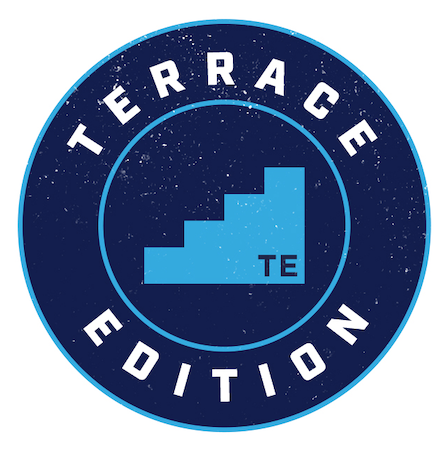A family reunion

Words: Damiano Benzoni
Images: Damiano Benzoni
The crowd flows like a river from the Köpenick S-Bahn station. The tributaries have streamed in small rivulets from all over town, trickling together on the S-Bahn platforms at Ostkreuz. And many will stop in the same spot, the popular fan pub Abseitsfalle, before finally making their way through the outer edge of the Wuhlheide forest and pouring into the An der Alten Försterei stadium.
Union Berlin is back home for the first time this season, for a friendly match with Rapid Wien: their last match here was the 1-0 win against Werder Bremen which sealed the first ever Champions League qualification for the Unioner.
The atmosphere is not only one of celebration.
It’s a homecoming, a family reunion, a refresher of the particularly elaborate liturgy of a Union Berlin home game. After the opposite team line-up is greeted with an ostentatiously indifferent “Na und?” (So what?), it’s time for the Eisern Apotheosis, as the Union players are elevated to the status of Fußballgott (football God) after their names are called.
Union dispose of Rapid with three second-half goals while donning their green-and-gold away kit (the home kit hasn’t been revealed yet, so also Rapid has to renounce its green-and-white colours and wear red instead). The Austrian fans are unphased by the result: they’ve reached Berlin in numbers for a week-day friendly and they chant without a pause, indulge in some pyros and unfurl a banner to honour club-legend Christopher Trimmel, now playing in front of their eyes with the Union Berlin captain’s armband.
©Damiano Benzoni. Rapid Wien at 1. FC Union Berlin.
The stadium is almost packed: 17 thousand people have gathered for a Wednesday 6 pm kick-off. The almost record crowd for a friendly hails the beginning of a crucial season for Union Berlin. The former East Berlin side, only four years after gaining their first promotion to the Bundesliga, will be the sole representative of the German capital in the top division for the very first time.
Union’s growth in the last few years has been steady and it’s likely that the An der Alten Försterei will be full week-in, week-out: after all it holds 22 thousand spots - almost entirely standing - against a member base of 45 thousand. It’s virtually impossible for a non-member to get to watch a Bundesliga game. Even members, if they do not hold a season pass, must go through a lottery to earn the right to buy a ticket.
It’s part of the allure of a club that treasures its atmosphere and its sold out games, but it is also an inconvenience. Not only will Union have to play its Champions League games at the Olympiastadion, on the other side of town from their cosy Köpenick home. It will also be the last season for the Alte Försterei as we know it: in Summer 2024 the stadium’s redevelopment will get underway. After playing the whole 2024-25 season as guests at the Olympiastadion, Unioners will meet again in a bigger home, projected to hold around 37 thousand fans.
It will be quite a shock for a fan base that is keen to keep things familiar, and a big challenge for Union: opening up to the world of Champions League football while maintaining its values and atmosphere intact. To grow commercially and on the pitch and preserve its identity and familiarity.
But that is a problem for tomorrow: for today, the crowd is content with lingering in their after-match beers and bratwürst at the Abseitsfalle. Just like a family reunion.
Images shot on Canon A35F (35 mm).
©Damiano Benzoni. 1. FC Union Berlin.
©Damiano Benzoni. 1. FC Union Berlin.
©Damiano Benzoni. 1. FC Union Berlin.
©Damiano Benzoni. 1. FC Union Berlin.
©Damiano Benzoni. 1. FC Union Berlin.
©Damiano Benzoni. 1. FC Union Berlin.
©Damiano Benzoni. 1. FC Union Berlin.
You can find me Damiano on Twitter and Instagram: @dinamobabel













